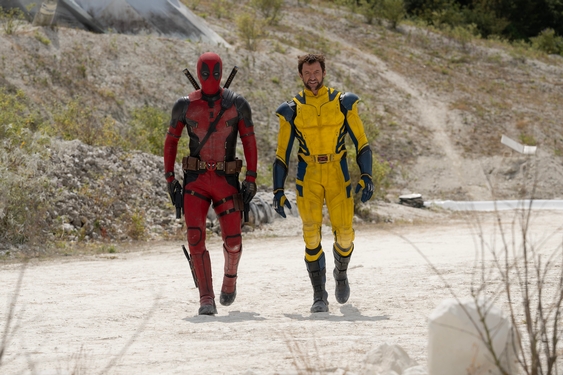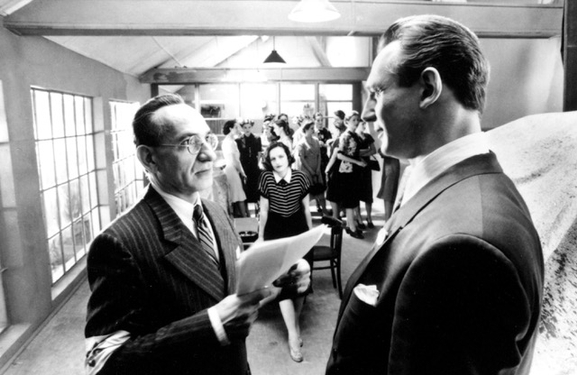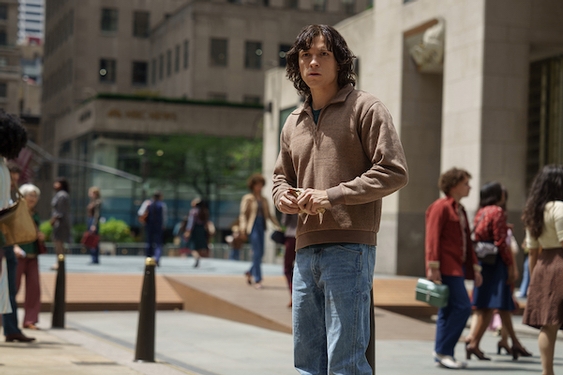Few dates on the annual movie calendar compare to that late July morning when the Toronto International Film Festival announces its first wave of premieres.
In addition to being one of Hollywood’s earliest signs that summer will soon end — what, you thought you’d make it into August? — it offers a cinephile Sudoku. And there was plenty to puzzle out on Tuesday after organizers’ press conference.
Does Ridley Scott’s science fiction survival picture “The Martian,” which was announced as a Toronto world premiere, have greater awards potential than Steven Spielberg’s espionage thriller “Bridge of Spies,” which wasn’t?
Will the movies about the gay and transgender community — they include high-profile debuts such as the lesbian drama “Freeheld” starring Julianne Moore and Ellen Page, Roland Emmerich’s historical pic “Stonewall” and Tom Hooper’s transgender-artist movie “The Danish Girl” — form a critical mass and buoy one another?
And what will it mean that Toronto is entering the second year of a policy meant to incentivize award-season hopefuls to head in its direction instead of stopping by the Telluride Film Festival first? How will the contenders that this year are bypassing Telluride for Toronto (they include Jay Roach’s “Trumbo” and Brian Helgeland’s gangster movie “Legend”) fare on the awards podium compared to those that are taking a lower-profile Toronto time slot or venue for the chance to stop at Telluride? (Those include Scott Cooper’s Whitey Bulger movie “Black Mass” and Tom McCarthy’s church-scandal movie “Spotlight.”)
The scrutiny makes sense. After all, there would seem to be much hardware at stake in Toronto, which often boasts a large percentage of the best picture nominees and last year counted as world premieres movies that won both lead actors, Eddie Redmayne and Julianne Moore, their Oscars. (Both are back this year; Redmayne is in “Danish Girl” playing a transgender person, in one of the more interesting awards-season narratives).
But what was apparent Tuesday amid the awards season decoding was something else: Toronto is starting to look, tentatively, beyond awards season. Don’t get me wrong — it doesn’t want to give up its important place on the calendar; far from it. But even as the festival seeks to hold on, it’s also pushing out in ways that have little do with the Oscar season that has defined it for over a decade, since the motion picture academy in 2003 moved up the big show by a month and helped kick-start all this craziness.
That’s evidenced at Toronto this year with the opening-night film, Fox Searchlight’s “Demolition.” The dark comedy would seem a slam-dunk awards contender. It features Jake Gyllenhaal — who is just waiting to reap some pent-up “Nightcrawler” goodwill — as an unhinged Wall Streeter, and has Jean-Marc Vallee as its director. Vallee is the man with the golden touch at the Oscars — actors from his “Dallas Buyers Club” won half of the acting prizes two years ago, and his lead and supporting actresses in “Wild” each picked up nominations last year.
Yet “Demolition” is opening the festival — arguably the highest-profile slot in Toronto — and then not coming out in theaters until April, until long after the last Oscar chocolate statuette has been cleared from the Dolby Theatre. And yet all parties seem just fine with it.
Meanwhile, the biggest news was something that stood well apart from Oscars season. That would be Michael Moore, who was able to shoot and edit a complete documentary, “Where to Invade Next,” without word getting out. It’s his first movie since “Capitalism: A Love Story” six years ago. No distributor is on board; in fact, it’s not clear how many distributors have even seen it, let alone making plans to angle for Oscars with it.
But it’s a major news event just the same, thanks to its subject matter. A person familiar with the project said it was a movie about the armed forces with surprising themes, and Moore offered at least a few hints in a short Periscope chat Tuesday. He called it a “film of epic nature” and said the thrust was the self-perpetuating nature of American warfare. Or, as he put it: “This constant need, it seems, to always have an enemy — where’s the next enemy? — so we can keep our whole military-industrial complex alive.”
Moore is hoping his movie, hitting in late 2015, starts swaying public opinion — actual voters, not the Oscar kind. “You get the sense he’s been saving himself to say something special, to say something meaningful,” Thom Powers, who heads Toronto’s documentary section, told The Times on Tuesday.
Powers wasn’t the only Toronto executive to place the emphasis away from the Oscars. “Our dirty little secret is we’ve never really programmed with award season in mind,” said festival director Cameron Bailey in an interview Tuesday afternoon. “It’s like a beautiful warm wave when it happens, and it’s fun sometimes to play that game about what’s been nominated and not nominated, but we really are just looking for the best films that are generally available.”
That may sound a little self-justifying coming from someone who just missed out on some Oscar bragging rights — in February, “Birdman” became the first movie in eight years to win best picture without playing Toronto. (Searchlight chose to close the New York Film Festival instead of heading north, where it would have been given a slot later in the festival, thanks to the Telluride rule.)
But Bailey is not simply rationalizing. He is genuinely looking outside the confines of film awards season — in fact, of film in general. For the first time this year, Toronto will host a “Primetime” section that will premiere a half-dozen TV shows in its official selection. Over the past few months, Bailey and his team been cycling through Hollywood, meeting with executives from the likes of Showtime, FX and other TV powerhouses to see what slots he might give to new and returning shows — a far cry from the simple confines of Oscar season.
Bailey this year will also screen Cary Fukunaga’s child-soldier movie “Beasts of No Nation” from Netflix — a feature, yes, but one going day and date and boycotted by many theater chains.
With content creation and consumption changing, the feeling is that festivals should move with the zeitgeist. Toronto will not abdicate its role as an awards-season launch pad anytime soon. But its role is shifting.
“In the past few years, awards season has been much less predictable — the movies that seem to be made to win awards are not the ones that catch fire with voters,” Bailey said. “If we tried to handicap the races we’d be wrong. So we can’t think that way.”
———
©2015 Los Angeles Times
Visit the Los Angeles Times at latimes.com
Distributed by Tribune Content Agency, LLC.












